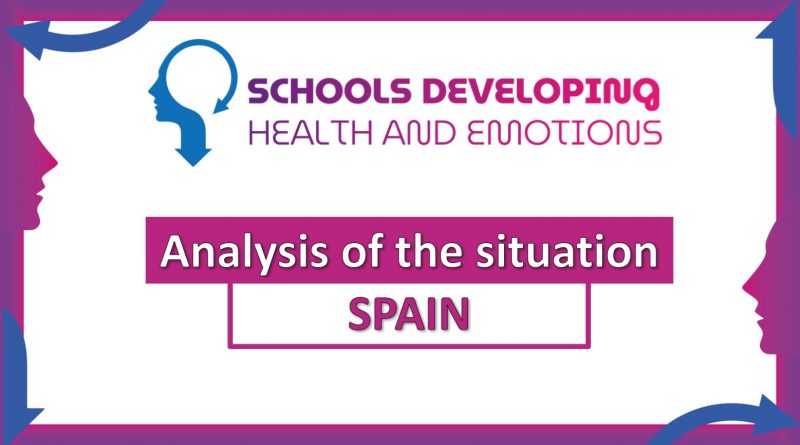Analysis of the situation: Spain
In the frame of Phase I, each project organisation had to analyse the existing situation on each project country on the promotion of health and emotional education in secondary schools and their institutionalization in its country. Here you have a summary of the text written by Consejería de Educación y Deporte concerning the situation of Spain:
First of all, it must be pointed out that in Spain educational competences are shared between the Ministry of Education and Vocational Training and the 17 Autonomous Communities. Consequently, school programmes promoting health and emotional education vary considerably in their design and implementation from one region to another.
Secondly, the Spanish Organic Law on Education 2/2006 (LOE), in force since 2006, has been recently modified by the Organic law 3/2020 (LOMLOE). The new law places the common interest and children’s rights as guiding principles and recognises the importance of the development of key competences in education.
The Ministry of Education and Vocational Training establishes the general guidelines of the Government on education policy and the regional departments of education have executive and administrative competencies for the management of education policies in their own territories.
We are going to focus on describing how the promotion of health is regulated in secondary schools in Andalusia. The main actions addressing health and emotional education in the southern region of Andalusia are: Curriculum, School Innovation Programmes, Teacher training, Educational resources on emotional education and Legislation.
Both emotional development and health promotion are considered educational purposes and they refer to the UNESCO guidelines on the four pillars of learning: learning to know, learning to do, learning to live together and learning to be. Education as a tool for the integral development of the person implies not only the development of the cognitive but also of the affective dimension.
In Secondary Schools, Emotional Education and Health Promotion are included in all subject areas, offering schools the freedom to implement school programmes and projects. Increasing efforts have been made by educational administrations to integrate emotional education and health promotion in schools. This is due to the fact that neuroscientists support the need and benefits to work on Emotional Education in the classroom.
In Andalusia, all schools have access to the healthy living school programme including emotional education as a compulsory area to develop. The Regional Ministry of Education and Sport in Andalusia through its Schools Programmes Department has the aim of improving the education system by enhancing innovation in education. The School Programme Department, our organisation, develops different types of programmes focused on different topics: Environmental Education, Literacy, Entrepreneurship Education, Cultural Heritage Education, Digital Education and Healthy Living.
The Healthy living program, born in 2015, is a tool for developing keys competences, exchanging experiences, team working, networking, developing innovative methodologies for the promotion of health and supplying the treatment of curricular contents related to emotional well-being, nutrition and physical activity, hygiene habits and self-care, driver education, sexuality and egalitarian relationships, the responsible use of technologies, or the prevention of drug dependencies and addictions, included in the Educational Project of each centre/school.
Its main characteristic is that it is conceived from a salutogenic perspective, emphasizing what generates health and not what causes diseases.
The School Programme Department develops the Healthy Living programme in four different modalities, the last two in Secondary Schools:
‑Creciendo en Salud (Growing in Health): 0–3 years old/toddlers: Nursery Schools;
‑Creciendo en Salud (Growing in Health): Primary and Special Education Schools;
‑Forma Joven en el Ámbito Educativo (Training young people the educational field): Secondary Schools;
‑Escuelas Promotoras de Salud (Health Promoting Schools): All schools.
Finally, it is important to add that in the training of teachers in Spain, there is not a specific subject connected with the topics of this projects: promotion of health and emotional education. Teachers, voluntarily, acquire training through the following ways that the Department of Education and Sport offers:
‑Training provided by teacher training centres;
‑Peer-training included as part of school programmes on healthy living promotion;
‑Exchange of good practices.
Projects like “Schools Developing health and emotions” are a real opportunity to reinforce the key competences of secondary school teacher and other professionals in the field of school education for promoting comprehensive health at school by the exchanging of experiences, good practices and methodologies.

